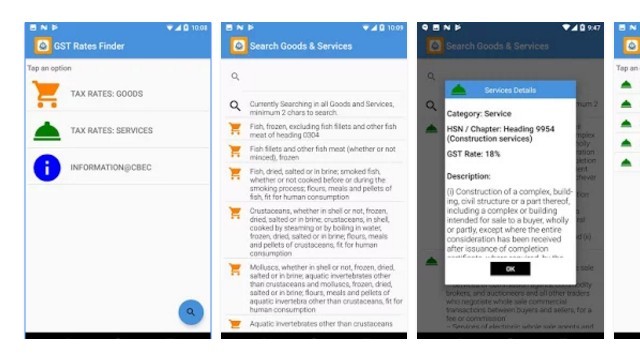
GST Rates Finder app has been launched by Finance Minister Arun Jaitley to help verify the correctness of GST charged on any purchase. “This mobile app helps users to find rates of GST for various goods and services.
It can be downloaded on any smartphone and can work in offline mode, once downloaded. The user can determine the GST rate for a good or a service by entering the name or chapter heading of the commodity or service,” the Finance Ministry said in a statement on Saturday.
The GST Rates Finder app, which is now available on the Android platform, will soon be available on the iOS platform as well.
How to download and use this app
To download the GST Rates Finder app, simply head to Google Play Store on your mobile phone or Android tablet, and search for GST Rates Finder. Alternatively, follow this link to directly download the app.
Search results on the GST Rates Finder app will list all the goods and services containing the name which was typed in the search box.
The user can scroll down the list of descriptions and when any specific item on the list is clicked, the display window will pop-up, containing details such as GST rate, description of goods or services, and the chapter heading of the Harmonized System of Nomenclature (HSN).
For example, any person who has been billed by a hotel or a restaurant or for footwear can cross verify the correctness of the rate of GST charged.
A taxpayer can search for applicable Central GST, State GST, Union Territory GST rate and Compensation Cess on a supply. The search can be made based on the description of goods or services or HSN chapter or section or heading number.
“These initiatives are aimed to serve as a ready reckoner on GST rates. This will empower not only the taxpayers but every citizen of the nation, to ascertain the correct GST rate on goods and services,” the statement said. This app will play a very important role in the transition of the GST process, also it will bring clarification among the people regarding GST.
Related Articles
GST Rates for Goods
The GST rate is the tax rate, which is payable at the time of sale of the goods by the supplier. A tax invoice is created in the name of the receiver to pay the tax to the government. more
GSTR 9 Extension Notification
According to the CGST Act, GSTR 9 and 9C for the financial year 2019-20 was to be filed by31st December 2020. Check out here the extension notification. more
Latest updates on GST in India
Check out the latest updates and happening in GST for the year 2021. Subscribe to our newsletter and stay updated. more
Know about e invoice gst gov in
the https://einvoice1.gst.gov.in is now the Official e-Invoice website of GST in India. One must log in and register on the Goods and Services Tax e-invoice website to upload invoices. more


